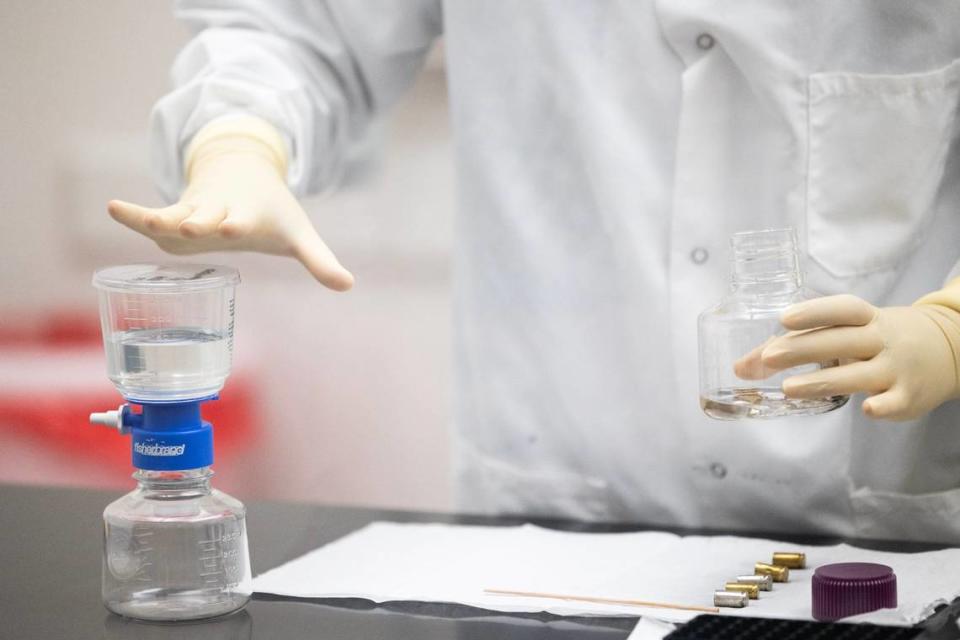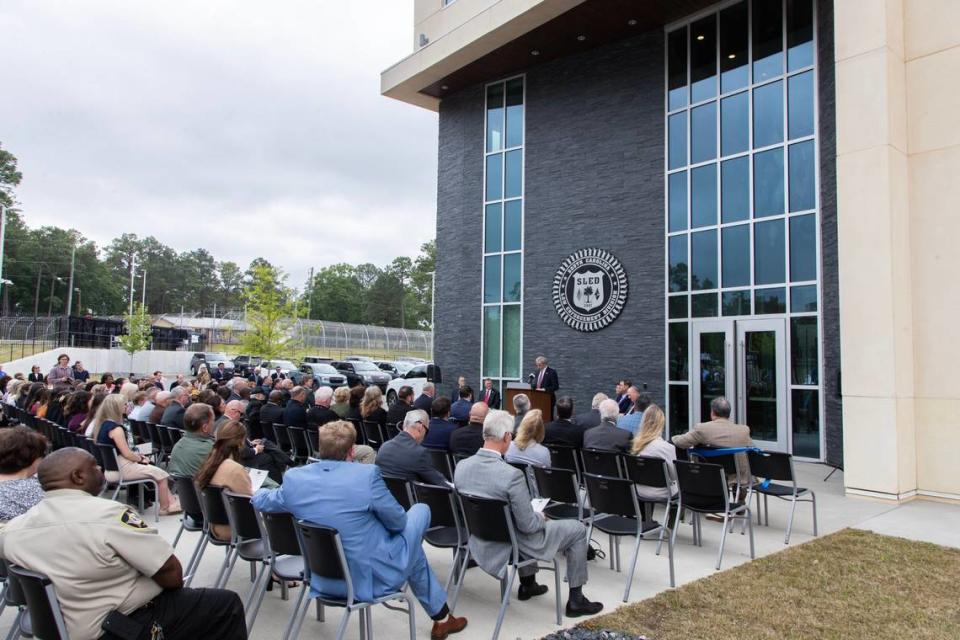NC is solving cold cases by testing old rape kits. Why isn’t SC clearing its backlog?
The key to solving the gruesome rape of a 13-year-old girl sat for nearly 30 years in the storage unit of a small North Carolina police department.
George Lilly III, 21 at the time, forced his way into the girl’s Spring Lake home in November 1989 before raping her at knifepoint. It wasn’t until July 2019 that the sexual assault kit collected after the crime was tested.
Spring Lake Police Lt. Greg Wilkerson wasn’t with the department when the break-in and rape occurred, so he couldn’t say why the kit remained untested for so long — he guessed it might have been forgotten or technology wasn’t advanced enough to detect the DNA at the time.
But when the nearby Fayetteville Police Department received a grant to clear its rape kit backlog, the Lake City department jumped at the chance to seek closure on some its oldest cases.
“It was definitely rewarding for us as an agency ... to get this closed and arrest this individual,” Wilkerson said, noting Lilly was arrested in 2020 and is now serving a 12-year prison sentence.
Lilly’s arrest is one of more than 40 cold cases dating back as long ago as 1984 to be solved during recent years in North Carolina thanks to a concerted effort by the state’s law enforcement agencies to clear a rape kit backlog that was once described as the nation’s largest.
That commitment stands in contrast to South Carolina, where the extent of its backlog remains unknown, a mandate from state lawmakers to begin tracking the kits is delayed and no requirements are in place to test the potentially vital pieces of evidence.
The S.C. Law Enforcement Division, where most agencies send their kits to be tested, had 1,987 kits awaiting testing through the end of October, according to a spokeswoman. But that number doesn’t take into account rape kits sitting in storage at police precincts across the state.

In addition to the possibility that violent offenders who otherwise could be identified and arrested are moving freely, the untested or long delayed testing of kits makes it less likely that victims of these sexual assaults report their traumas to law enforcement, advocates and survivors say.
“At the end of the day, we want to report these violent crimes just like we report other violent crimes, ... but we know sometimes they’re going to be re-traumatized and impacted in a really negative way because of how they’re received, so it’s really hard for us to encourage people to report,” said Lindy Studds, executive director of the Rape Crisis Center of Horry and Georgetown Counties.
Importance of testing rape kits
Jill Dudley was short of breath as she hung up the phone with the Horry County officer, unable to fathom how quickly her life had gone from the highest of highs to the lowest of lows so quickly.
The Socastee native had just been named Miss South Carolina months earlier in June 2022. She planned to go public with her story of being raped in 2021 without receiving justice as part of an advocacy campaign in her new position. But first, Dudley wanted access to the dismissed police investigation to make sure she knew what information would be available to anyone wanting to later attack her credibility, she said.
When she saw that the case was dismissed for “lack of evidence,” Dudley asked the officer what happened to her rape kit — the product of an “invasive,” “excruciating” hourslong forensic examination she was subjected to in the immediate aftermath of being assaulted.

It was discarded and never tested, Dudley said she was told.
“I was completely devastated,” she said. “It was almost like a part of me was gone. ... I knew there was no potential justice ever, ... it was the end. But it wasn’t the end of my suffering and dealing with the psychological trauma of going through something like that.”
Sara Barber, executive director of the South Carolina Coalition Against Domestic Violence and Sexual Assault, said it’s important to remember that each kit represents a person and their story, so it’s vital they’re treated with respect, whether they can be used to catch a serial rapist or not.
“In the vast majority of cases, people know who assaulted them, so (the kit is) not going to necessarily result in a prosecution,” Barber said. “But like any other medical test that you go to do, you expect it to be tested.”
Dudley knew the person who raped her, she said.
New SLED lab
Spartanburg Police Capt. Mark Hillers confirmed that they do prioritize getting kits tested when the suspect is unknown. He suggested most of the state’s backlog likely involve cases where both parties have admitted to sexual intercourse, but the question is whether it was consensual.
“Those are lower priority for testing because it’s not really proving anything,” he said. “They will get submitted for testing, but it’s mainly for court purposes.”
Hillers noted that SLED has always quickly processed rape kits for his agency’s priority cases.
First Circuit Solicitor David Pascoe agreed that SLED is responsive in expediting certain cases, but added that they otherwise typically have to wait at least 18-24 months for rape kit test results.
That lengthy wait is concerning not just for unsolved crimes but also because it may mean an innocent person is sitting in jail longer, Pascoe said.
SLED moved late last year into a new $62.8 million forensic services laboratory that advocates hoped would increase the agency’s ability to process the kits more quickly, but it’s unclear whether that’s happened so far.

Fifteenth Circuit Solicitor Jimmy Richardson said he’s noticed test results getting back to his office more quickly since the new lab opened, but Pascoe said his office hasn’t seen any improvement.
SLED refused multiple interview requests to discuss the new lab or its impact on rape kit processing.
Delayed tracking system
The agency is also required to oversee the implementation of a statewide sexual assault kit tracking system, but it’s more than a year behind schedule.
Legislators passed the law in 2020 to create the tracking system, giving SLED a deadline of June 1, 2022. The agency has procured a vendor and was rolling out a pilot program while anticipating the system being fully operational by the end of 2023, according to SLED Chief Mark Keel’s July 31 letter to stakeholders.
Barber said that, while she’s been frustrated with the delay, she believes SLED personnel are working in good faith to ensure the system works as intended.
The system is particularly important for survivors, she noted, because it will allow them to anonymously track the status of their kits, granting them more control in a process that otherwise leaves many feeling helpless.
Barber is hopeful that the system — which will offer biannual reports with data including the total number of kits by jurisdiction, the number of kits awaiting testing and the average length of time for testing to be completed — will lead to increased pressure to clear the state’s backlog.
Ilse Knecht, policy and advocacy director for the Joyful Heart Foundation, a nonprofit pushing for states to enact legislation to clear untested rape kit backlogs, said that while the tracking system is an important first step, it will only account for kits collected moving forward, so South Carolina still won’t have a full accounting of its kits awaiting testing.
North Carolina mandated in 2019 a full inventory, identifying 16,000 sexual assault kits in law enforcement storage units across the state. That was coupled with a mandate to test all kits where a case was still pending, and fewer than 1,000 of those tests remain untested, according to the North Carolina Attorney General’s Office.
That effort has led to more than 2,000 DNA matches and 88 arrests, the office’s tracking dashboard shows.
Mandated testing is key, Knecht said, because research shows backlogs continue to grow in states without that law.
“(Whether or not a kit is tested) comes down to one person’s decision, who may not have training about victimization or DNA, and can misunderstand survivors’ reactions,” she said. “It’s not prioritizing sexual assault as the violent crime that it is.”

